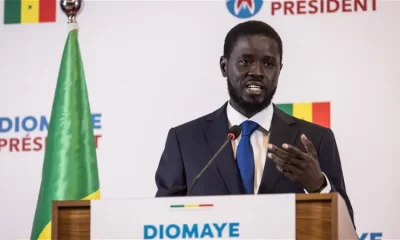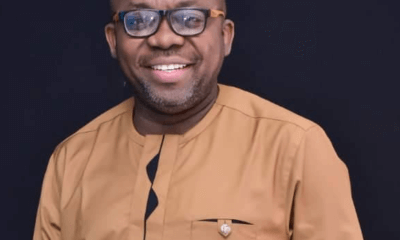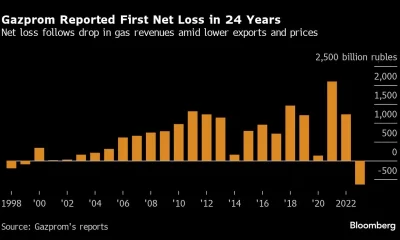Democracy & Governance
EFCC, DSS, Police: Unearthing Injustice Among Appeals Court Judges and Beyond -By John Egbeazien Oshodi
Complementing this formidable arsenal is state-of-the-art surveillance equipment, meticulously crafted to oversee a diverse spectrum of communications. Whether it involves wiretapping, vigilant online chat monitoring, or discreet phone call tracking, these instruments provide an invaluable window into the clandestine activities of those under intense scrutiny.

In recent times, Nigeria’s judicial landscape has been marred by a series of contentious decisions that have left the nation in disarray and sowed seeds of distrust within its legal system. These decisions, stemming from the Court of Appeal, have not only raised grave concerns but also ignited a raging firestorm of suspicion among legal experts, citizens, and even within the highest echelons of the judiciary, including the esteemed justices of the Supreme Court.
At the epicenter of this tempest lie the judgments handed down by the Court of Appeal in the Governorship election petitions cases in Plateau, Kano, and Zamfara states. While the content of these decisions has been contentious in its own right, what has truly raised eyebrows is the perplexing manner in which these cases have been handled, casting an ominous shadow upon the integrity of the appellate court.
Among these cases, the Plateau State governorship petition has sent shockwaves rippling through the legal community. It orbits around the alleged invalid sponsorship of Governor Caleb Muftwang of Plateau State by the Peoples Democratic Party (PDP). In November 2023, the Court of Appeal delivered a ruling that Governor Muftwang was not validly sponsored by the PDP, thereby nullifying his election and proclaiming the candidate of the All Progressives Congress (APC), Nentawe Yilwadta, as the rightful governor of the state. This verdict also extended its reach to nullify the victories of 11 PDP candidates elected into the state and National Assembly, citing similar grounds of alleged invalid nomination.
However, the recent judgments of the Supreme Court have turned the tide, overturning the decisions of the Court of Appeal and affirming Governor Muftwang’s electoral triumph. While this may superficially appear as justice served, a disconcerting discrepancy emerges – the ousted state and federal legislators are left in a legal quagmire as electoral laws truncate their appeals at the Court of Appeal, an incongruity that fuels suspicions of selective or inconsistent application of the law.
These suspicions have not merely reverberated within legal circles but have also permeated the concerns of vigilant citizens. Prominent lawyer Professor Mike Ozekhome has lamented what he aptly describes as an irrevocable injustice inflicted upon Plateau State by the Court of Appeal. The appellate court’s decision, in this instance, has not only stripped away the voting rights of the people but has rattled the very bedrock upon which democracy stands.
While this may not constitute an overt, violent coup, the repercussions for Nigeria’s fledgling democracy are equally profound. The actions and judgments of the judiciary have dealt a blow deeper and more insidious than any military takeover, eroding the trust and faith that should serve as the sturdy pillars supporting a thriving democratic system.
In response to these disconcerting developments, the former Chairman of the National Human Rights Commission (NHRC), Professor Odinkalu, has called upon the President of the Court of Appeal, Justice Dongban-Mensem, to tender her resignation. He views the Plateau State case as an extraordinary and willful miscarriage of justice that demands extraordinary measures. Odinkalu, in no uncertain terms, accuses the President of the Court of Appeal of either being grossly irresponsible or comprehensively corrupt, contending that such a figure has no place within the hallowed halls of a credible judiciary.
The pain endured by the legislators, who were voted into office through a rigorous electoral process, is immeasurable. These lawmakers, representing the aspirations and voices of their constituents, now find themselves unjustly stripped of their mandates. The voters who cast their ballots in good faith, believing in the democratic process, are left in disillusionment as a few judges make decisions that determine not only who becomes governor but also who enters the legislature.It is not just legal practitioners and citizens who are raising alarm bells.
The fact that even within the Supreme Court, an institution not devoid of its own occasional integrity issues, some justices themselves express deep concern and disturbance over the suspicions surrounding the Court of Appeal’s decisions is profoundly significant. It underscores the gravity of the situation and the potential implications for the justice system as a whole. When justices of the highest court in the land voice reservations about decisions made by lower courts, it reflects a genuine concern for the integrity of the entire judicial process. It suggests that there may be legitimate reasons to question the fairness and correctness of the lower court’s judgments.
In particular, the remarks of Supreme Court Justice Emmanuel Agim, who delivered the lead judgment, bear significant weight. He emphasized, “We have held in a plethora of cases that the sponsorship of a candidate for election is an internal affair of a political party. The Court of Appeal lacks the jurisdiction to determine the validity of the candidacy of the PDP.” Justice Inyang Okoro, who led the five-member panel, echoed these sentiments, stating, “My only worry is that a lot of people have suffered as a result of the Court of Appeal’s decision. It was absolutely wrong.”
These candid statements from the Supreme Court justices underscore the pressing need to address the miscarriage of justice and the deep-seated suspicions surrounding the decisions of the Court of Appeal.
In response to these profound concerns, there is a growing consensus among legal minds, concerned citizens, and even the affected politicians that a comprehensive investigation is an imperative. This investigation must delve deep to unearth the truth behind these highly controversial judgments. This is where Nigeria’s Department of State Services (DSS), the Police, and the Economic and Financial Crimes Commission (EFCC) must play a pivotal and impartial role by venturing underground to expose any potential corruption, collusion, or external influences that may have tainted the course of justice.
To conduct this thorough and clandestine investigation into these unsettling suspicions, it becomes paramount to meticulously identify potential suspects and sources of influence within the legal system. This includes retired judges who may have ties to the judges in question and could potentially possess insights into irregularities or improper interactions during their tenure. Additionally, examining retired registrars who previously served in the courts where these contentious judgments were rendered can provide invaluable information.
Legal practitioners, court workers, staff, former and present, with close affiliations to the judges under suspicion should also be subjected to scrutiny, with a keen eye on signs of misconduct or financial transactions aimed at influencing cases. Judges’ family members, who could play a clandestine role in these activities, should be thoroughly scrutinized for any financial transactions or unusual conduct that could raise suspicions.
The investigative net must also encompass court staff, including clerks and administrative personnel, who may have knowledge of irregularities or improper conduct and should be discreetly interviewed. Moreover, professional relationships between judges and other legal professionals, such as fellow judges and lawyers, should be meticulously examined for any attempts to influence or manipulate cases.
The examination of financial records is a critical aspect of this operation, as it can unveil any unusual or suspicious financial activities among judges, retired judges, registrars, lawyers, and family members. Conducting surveillance and monitoring of electronic communications, including phone calls, emails, and text messages, can provide invaluable insights into covert interactions and any plans to influence judicial decisions.
Identifying potential witnesses who may have observed or possess knowledge of any illicit activities related to the judges under suspicion is an essential part of this endeavor. These witnesses should be discreetly interviewed to safeguard their safety.
In cases where there are indications of involvement or influence from foreign actors or entities, seeking international cooperation and intelligence sharing may become necessary to uncover hidden connections.
Throughout the entirety of this clandestine investigation, it is of utmost importance to ensure the protection of whistleblowers within the legal community who may possess invaluable information about misconduct or attempts to influence judges. Their safety and anonymity must be secured to encourage the free flow of information essential to this pursuit of justice.
Upon accumulating substantial evidence through these covert investigations, law enforcement agencies such as the police, Economic and Financial Crimes Commission, and the Department of State Services can seek court orders to take appropriate legal action. The overarching objective is to uphold the rule of law, serve justice, and ultimately restore public confidence in the judiciary, especially in cases where deep concerns have arisen due to alleged miscarriages of justice like those seen in Plateau State.
In the intricate realm of suspected judicial corruption, conducting a deep-tech investigation involving communication gadgets necessitates the strategic deployment of advanced technological tools and methodologies. This multifaceted approach encompasses a spectrum of high-tech solutions, each playing a pivotal role in the pursuit of justice and the restoration of faith in democratic principles.
At the core of this investigative mission lies the strategic deployment of cutting-edge digital forensics tools, precision instruments finely tuned to extract crucial data from electronic devices. These tools serve as the bedrock of evidentiary support, wielding an uncanny ability to unearth buried information, resurrect deleted messages, and meticulously piece together the fragmented segments of the digital puzzle.
Complementing this formidable arsenal is state-of-the-art surveillance equipment, meticulously crafted to oversee a diverse spectrum of communications. Whether it involves wiretapping, vigilant online chat monitoring, or discreet phone call tracking, these instruments provide an invaluable window into the clandestine activities of those under intense scrutiny.
Further reinforcing this technological arsenal are data analytics and artificial intelligence (AI), vigilant sentinels that steadfastly guard vast datasets. These tireless algorithms diligently uncover concealed patterns and anomalies that may hold the elusive clues to corruption. In the skilled hands of analysts, these tools metamorphose raw data into actionable insights, expertly guiding investigators through the intricate labyrinth of justice.
Stepping boldly into the fray are cryptography analysts, possessing a profound mastery of encryption. They embark on the delicate task of deciphering encrypted messages, unveiling the covert realm of concealed communications. In a landscape shrouded in secrecy, their expertise emerges as an indispensable beacon of revelation.
Advanced voice and speaker recognition technologies further enhance the investigator’s capacity to identify the key figures entangled in suspicious communications. They breathe life into voiceprints, facilitating the unequivocal identification of pivotal players within the intricate web of corruption.
The orchestration of covert sting operations represents a meticulous choreography of subterfuge, a masterful dance aimed at capturing real-time incriminating interactions. Undercover agents, virtuosos of deception, infiltrate the shadowy realms of corruption, propelled by a singular mission to extract concrete evidence.
Blockchain and digital signatures analysis emerge as the torchbearers tasked with illuminating the concealed financial underbelly of corruption. Their meticulous endeavors trace the convoluted flow of funds, exposing potential financial irregularities that lie hidden beneath the surface.
Taking to the skies are surveillance drones, providing an aerial perspective that transcends the confines of traditional surveillance methods. From their elevated vantage point, they scrutinize the terrain, skillfully unraveling the enigmatic tapestry of activities below.
Amidst this relentless pursuit, it is imperative to acknowledge the sinister tactics employed by those ensnared in corruption’s web, often utilizing even their own families and a network of associates as shields or accomplices. This treacherous dimension only intensifies the commitment of the investigators to unearth the truth, sparing no sanctuary, whether it be in chambers, homes, hotels, or within the inner circles of their associations.
Ensuring the sanctity of findings, robust cybersecurity measures are meticulously implemented, fortifying defenses against potential leaks or tampering of evidence.
Yet, amid this formidable array of technological resources, there exists a shadow of concern about leadership within the agencies involved. Historically, these organizations have grappled with the specter of poor leadership and ethical challenges. Many within their ranks have been shaped by an environment steeped in duplicity and corruption, casting a shadow of chronic concern upon the law enforcement and security agencies and the nation itself.
For far too long, the image of leadership within these agencies, both in the past and the present, has been tarnished. These agencies have, regrettably, been groomed within an environment where duplicity prevails, a situation that has been chronically concerning for both the law enforcement and security agencies and the nation.
However, even in the face of this disheartening history, there persists a fervent dream and belief that within the ranks of these organizations, there must exist men and women possessing an unyielding sense of discipline, unwavering integrity, and an innate sense of responsibility. These individuals, it is believed, rise above the siren calls of gratification, bribery, and other compromising influences. Their spirits are forged in the crucible of unwavering commitment to justice.
If granted the power of a metaphorical “magic wand,” the fervent wish would be to place Chairman Ola Olukoyede of the Economic and Financial Crimes Commission (EFCC) at the helm, accompanied by a select cadre of principled investigators. Together, they would embark on a singular mission to pursue and expose the judicial rogues that threaten the fabric of justice in Nigeria. In their unwavering dedication, they hold the promise of rekindling faith in justice, integrity, and democracy within the nation. The destiny of the nation’s judiciary and democracy, teetering on the precipice, would rest upon their shoulders, and it is their leadership that would guide the way.
In the relentless pursuit of justice, there can be no refuge for shadows or doubts. Nigeria’s democracy and the faith of its citizens in the legal system teeter on the brink, relying on the unwavering exposure of any judicial injustice. Only when the unvarnished truth emerges can the nation rebuild trust and confidence in its judiciary, ensuring that justice becomes a undeniable reality.
The actions and judgments of the appeal judges cast a long shadow of suspicion. These suspicions hold profound implications, not just for the individuals affected by their rulings, but for the integrity of the entire judicial system.
Suspicion arises when actions or decisions appear dubious or unjust. In this context, suspicions stem from perceived injustices in the judgments rendered by the appeal judges.
One significant consequence of these suspicions is the erosion of trust in the judicial system, a cornerstone of democracy. When citizens doubt the actions of judges, the foundation of justice trembles.
The repercussions extend beyond mistrust. Individuals and lawmakers affected by these judgments endure emotional distress, anxiety, and frustration. The perception of injustice takes a toll on their well-being.
The specter of bias or favoritism among judges deepens suspicions, questioning the purity of the pursuit of truth and justice. In this crucible of doubt, justice and democracy in Nigeria await restoration, reliant on the unwavering pursuit of truth and faith in the judiciary.
In conclusion, the mission embarked upon by the EFCC, DSS, and the police transcends the boundaries of a mere investigation; it is a profound odyssey, a tireless quest to rekindle democracy’s flickering faith in the judiciary. With unwavering resolve, they descend into the murky depths, employing covert methods, and harnessing advanced technology in their relentless pursuit. Their singular goal: to unveil the enshrouded shadows, to expose the rampant corruption, and to ensure that justice emerges triumphant. As the very foundations of democracy tremble, it is our fervent hope that these agencies will succeed in upholding the sacred principles of justice and democracy in Nigeria. The destiny of the nation’s judiciary, and indeed its democracy, teeters precariously on the precipice, and it is in the courageous hands of the EFCC, DSS, and the police that our collective future rests.
Professor John Egbeazien Oshodi, born in Uromi, Edo State, Nigeria, is an American-based police and prison scientist, forensic psychologist, and legal psychologist. He’s a government advisor on forensic-clinical psychological services in the USA and the founder of the Dr. John Egbeazien Oshodi Foundation for Psychological Health. With a significant role in introducing forensic psychology to Nigeria through N.U.C. and Nasarawa State University, he’s also a former Secretary-General of the Nigeria Psychological Association. He’s taught at esteemed institutions like Florida Memorial University, Florida International University, Nova Southeastern University, and more, and is currently an online faculty member at Weldios University, Nexus International University, and Walden University. John.Oshodi@mail.waldenu.edu



















